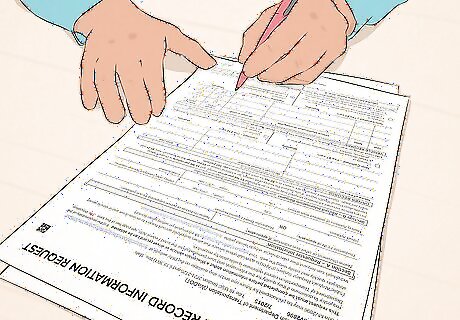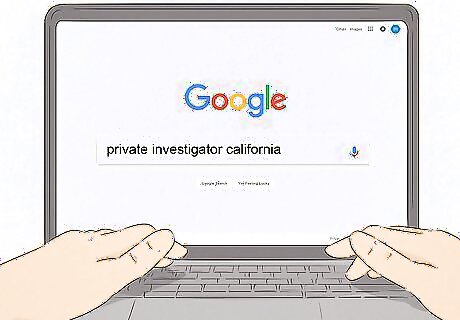
views
X
Trustworthy Source
State of Michigan
Official website for the State of Michigan
Go to source
Gathering Information

Identify the reason you need to find the owner. Most governments restrict access to information about registered owners of motor vehicles for privacy reasons. Before you can get personal information about the owner of the vehicle, you’ll need to demonstrate that you have a legitimate reason. For example, you might need to find the owner of a vehicle if you’ve been involved in an accident, or if you’re conducting research that involves statistics about motor vehicle ownership. You might also need access to this information as part of your job (e.g., if you’re an insurance agent or someone in charge of towing or impounding vehicles). Giving false information or lying about your reason for seeking the information on a government form or other legal document may result in fines or even jail time, depending on the laws where you live.

Contact law enforcement. If you are the victim of a hit-and-run, or if finding the vehicle's registered owner is a matter of public safety, call on local police to assist you. They have more resources to track down the owner. You may not be given the information yourself, but the police will assist with whatever you need to do. For example, if someone abandoned a car in the parking lot of your business, the police could help you contact the owner to remove the vehicle from your property.

Find out as much as you can on your own. If all you have is a license plate number, it can be extremely difficult to find out the name of the owner. More information gives you a greater chance of success. If you took a picture of the tag, you probably also know the color of the car, maybe even the make and model. Do an image search online to narrow down the car's year. From the plate itself, you can figure out the state that issued the plate, and maybe even the city or county where it was registered. You also can find out whether the tag has expired.

Talk to your insurance company. If the driver was responsible for damage to your vehicle or your property, you need to file an insurance claim. Insurance claims agents have additional resources to locate the driver of the vehicle. Provided your insurance company accepts the claim, they typically will take care of locating and suing the owner of the vehicle. Depending on the outcome, you may never have any reason to learn the driver's identity yourself.

Try to find out the vehicle identification number (VIN). In some places, you must have the VIN as well as the tag number to get any information at all about the registered owner. This helps prevent false identification. If the license plate number wasn't issued for that vehicle, the search results will note that. You may get results for both the VIN number and the plate number. You also can look for information by looking up the car's VIN. You may have to pay a fee for a VIN report, but it can give you additional information about the owner (although you may not be able to find out their name).
Using Government Resources

Locate the government office in charge of registering motor vehicles. If vehicles have license plates, there is a government agency that issues those plates and tracks them. The rules regarding who can access that information depend on the country, state, or province that issued the license plate. This can be somewhat difficult if the license plate was issued in a faraway place. If you have to send your request through the mail, expect it to take weeks if not months to get a result.

Review authorized reasons for accessing information. Privacy laws protect drivers by only allowing certain information to be shown under limited circumstances. The allowed reasons vary depending on the state that issued the license plate. Typically you can find a list of authorized reasons online. Look for the official website of the government agency that issued the license plate. If you can't find the information online, you can always call a motor vehicles agency office and ask. Explain that you want to find a vehicle's registered owner and the only information you have is a license plate number. Tell them why, and they will tell you what they can do to help you, if anything. In some places, you won't be able to find out the name of the vehicle's registered owner for any reason, absent the owner's knowledge and permission.

Complete an information request form. The request form requires you to provide information about yourself and the reason you are requesting the information. If it comes with instructions, read them carefully before you start filling out the form. Provide as much information about the vehicle, in addition to the license plate number, as you can. The more information you have, the more likely you will get a useful result. You may be able to find a copy of the form online. Look on the official website for the motor vehicles department or agency that issued the license plate. If you're trying to locate the title of a vehicle, go through your state's Department of Motor Vehicles (DMV). You'll have to fill out a form and pay any applicable fees.

Submit all required documents and fees. You must pay a fee for your search, which will vary but generally will be less than $50. Depending on the location and how you submit your form, you may be required to show proof of identity. Some governments may require documents or other information to back up the reason you are requesting information about the owner of the vehicle. Fees typically are based on the cost of the search, not whether any usable results are returned. If you get results, you may have to pay additional fees for copying. Make a copy of everything for your personal records before you send it.

Receive the results of your request. In some cases, you may get results from your request immediately. Typically, though, the agency will need some time to process your request and will mail you the results. You may want to follow up with the agency if you don't hear anything within 2 to 4 weeks of submitting your forms. Once you get the information, you may have to do additional research. For example, you may get the registered owner's first and last name, but not their address. You may be able to find a last known address or phone number for the person by doing a search online of their name.

Report auto accidents or crimes to the police. If you are the victim of a hit-and-run, or if you witnessed a crime or auto accident, let local law enforcement handle it. They can track down the owner of the vehicle for you. While you probably won't be given personal access to the driver's information, it will be made available to your insurance company if you filed a claim.
Hiring a Private Investigator

Look for a private investigator online. A basic online search will produce web pages of local private investigators as well as investigators who work entirely online. Compare the offerings on these web pages and see if something will work for you. Do your own research on any website you find to make sure it's a legitimate service and not a scam. If the page advertises a licensed investigator, you can check that license's status with the state or local agency that issued the license. Web searches can be particularly useful if the license plate was issued in a place far from you. Look for someone based there for best results.

Try an online search service. There are many online services that will comb through public records to find the person who was issued a particular license plate. However, most of these services charge fees and may not deliver the results you need. Search for sites that offer “license plate lookup” services, such as PeoplePublicRecords.org, to find out basic information about the vehicle, such as whether the driver has a criminal history or the car has been involved in accidents. Many of these websites are scams, and may mislead you into believing they have the results you need and then charging you high fees before you can even look at the results. When you get the information, it may be inaccurate or outdated. In most places, it is illegal for anyone outside law enforcement to run a license plate number to get information on a person. This doesn't mean that it's impossible to find a vehicle's registered owner using just a license plate number, but online services that claim to offer instantaneous results are probably scams.

Contact a local investigator. If the license plate was issued locally, you may want to hire a private investigator to track down the owner of the vehicle. Look online or in your local phone book to find the names and contact information for private investigators near you. Interview the investigator in person before you hire them, and make sure you understand how their services work and how you will be billed. Hiring a private investigator can get expensive, so if you have any budget limitations you need to discuss costs upfront. Most governments require private investigators to be licensed. Ask for the investigator's licensing information and make sure it's valid and up to date. Talk to the investigator specifically about what you want and why. Find out if they've done similar searches in the past, and whether they were successful in finding the vehicle's registered owner.

Research any investigator's background and experience. Before you hire a private investigator, you need to do a little investigating on them to make sure they have a good reputation and can get results. Ask the investigator for a few names of previous clients who you can contact for a reference. You also can check for reviews of the investigator online. If the investigator has a license from the city or state where they operate, see if you can look up their license number online. Check their license record for discipline or other negative marks.

Sign a contract with your investigator. Before you give the investigator any money to start work, get the specific terms of your agreement in writing. You need to know how long they will search for the owner and how they will report their findings to you. The contract should discuss all charges specifically, including any restrictions you've set for the investigator. For example, you may want the investigator to call you before incurring any additional expenses above a certain dollar amount. The contract also should discuss what type of report you will receive at the end of the investigation, and whether the investigator will contact you to give you status updates over the course of the investigation.


















Comments
0 comment